Former Fellows

Dr Emily Qureshi-Hurst
Emily Qureshi-Hurst is a philosopher whose research focuses on the philosophical questions raised by interactions between science and religion, particularly physics and Christianity. Emily has written on issues in the philosophy of religion, the philosophy of time (including issues in special and general relativity, quantum mechanics, and temporal experience), the philosophy of physics, and the philosophy of social media. Before taking up this fellowship, Emily completed her D.Phil at the University of Oxford (funded by AHRC) under the expert supervision of Alister McGrath. Her thesis examined the theoretical support for a B-theory of time provided by special and general relativity, and re-interpreted Paul Tillich's doctrine of salvation in light of this metaphysical temporal model.
During this fellowship, Emily's project brought philosophy and theology into dialogue with physics, and examined the challenges faced by Christianity in the light of Quantum Mechanics (QM) and the philosophy of time. Important research questions included:
- What does QM reveal about the nature of time?
The project began by discerning the best metaphysical theory of time given empirical and theoretical evidence from QM. Without a quantum theory of gravity, the exact meaning of QM for the nature of time will remain unanswered. This project considered to what extent QM can be understood to support a B-theory of time, namely the metaphysical model that understands time as static, meaning all moments in time co-exist and time does not really pass.
QM and a B-theory of time pose a frontier challenge to core features of Christian theology, namely salvation and moral responsibility. Salvation requires change – an individual is transformed from a state of fallenness to a state of redemption. If time does not pass, as is the case on the B-theory, then how can an individual change from being fallen at one point to being saved at another?
Another highly important question in the block universe concerns the possibility of freedom. If all events already exist in distant regions of spacetime, as the block universe describes, then agents cannot change their futures. If agents cannot enact genuine change, is choice an illusion?
- What might different interpretations of QM mean for the human condition?
This project also examined the Everett / Many Worlds Interpretation of QM, specifically focusing on a realist reading thereof. Everettians claim that the quantum equations, when taken at face value, entail the existence of a multiplicity of worlds. Moreover, these worlds are inhabited by many versions of us with whom we share a past and not a future. This fascinating and radical possibility is worth taking very seriously. This project intends to examine the implications of Many Worlds for the human condition. In particular, what it might mean for personal identity, salvation, and morality.
- How should Christian theologians and philosophers of religion respond to these challenges?
Whilst a significant aim of this project was to identify and express the challenges Christianity faces from modern physics, another important goal was to articulate possible responses to these problems. Included in this strand of the project was a wider, outward-facing dialogue with other scholars on challenges Christianity (particularly the doctrine of salvation) faces from modern science.
There is a substantial gap in the literature on the relationship between science and soteriology, despite the significant potential for such a dialogue. Of particular interest will be challenges posed to salvation by: evolutionary biology, the cognitive science of religion, the possibility of AI, and extra-terrestrial life (to name but a few!). Each of these raises important questions about humanity and our place in the world, and therefore has the possibility to both challenge and enrich our understanding of the nature of salvation. This interdisciplinary and collaborative venture would be another way of examining how Christianity can respond to frontier challenges posed by the sciences.
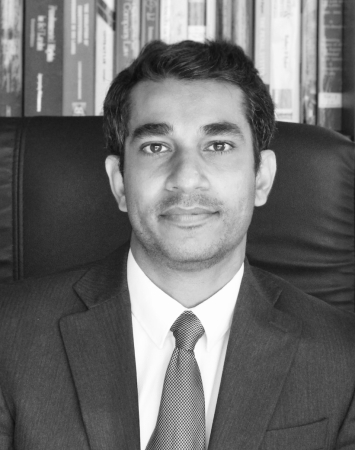
Dr Gehan Gunatilleke
Gehan Gunatilleke is a lawyer specialising in religious freedom, constitutional law, and international law. He holds a D.Phil in Law from the University of Oxford. His doctoral thesis focused on state authority to restrict the freedom of religion and the freedom of expression under international law. Gehan also holds a Master’s in International Human Rights Law from the University of Oxford, where he was a Commonwealth Scholar, and an LL.M from Harvard Law School, where he was a Fulbright Scholar. Prior to taking up a position as Junior Research Fellow at Pembroke College, he was a visiting fellow at the Programme on Law and Society in the Muslim World at Harvard Law School. Gehan is concurrently an Early Career Fellow at the Bonavero Institute of Human Rights, University of Oxford, and a visiting lecturer at the Centre for the Study of Human Rights, University of Colombo.
Gehan’s research sets out to explore the relationship between religion and social cohesion. It critically examines the impact of Sri Lanka’s inter-faith conflict resolution mechanisms. Over thirty such mechanisms have operated in Sri Lanka in the recent past, and have had varied levels of success. The research project aimed to answer the following research questions:
- To what extent have Sri Lanka’s inter-faith conflict resolution mechanisms succeeded in promoting societal cohesion, and preventing, mitigating, and containing religious violence and discrimination at the national and sub-national levels?
- Are mechanisms that build on commonalities between various faiths and religious traditions more sustainable and legitimate, and more likely to succeed in promoting societal cohesion and resolving conflicts?
The project tested the hypothesis that a model of ‘overlapping consensus’ – the idea that more sustainable and legitimate principles of justice can emerge from the overlap between various religious and philosophical traditions – can provide the foundation for successful inter-faith mechanisms in Sri Lanka.
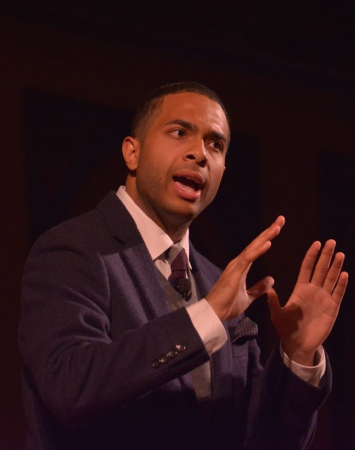
Christopher Wadibia
Christopher Wadibia is a scholar of the politics of modern Pentecostalism. His doctoral research studied the Redeemed Christian Church of God (RCCG), one of Nigeria's most popular and sociopolitically influential indigenous Pentecostal churches, and how its politics underpins investment in Nigerian development causes; and his next project will study the nexus between political Pentecostalism and racism in the UK. Prior to joining the programme, Christopher completed a BA Government at Georgetown University (2016), an MPhil Intercultural Theology and Interreligious Studies at Trinity College Dublin (2018), and a PhD Theology and Religious Studies at Selwyn College, Cambridge (2021). Alongside his Junior Research Fellowship, Christopher serves as the Assistant Editor of the academic journal PentecoStudies and is an Affiliated Researcher at the Cambridge University Woolf Institute. Christopher’s research interests include global Pentecostalism; religion, politics, and global development; religion, society, and public policy; and Muslim-Christian relations. Christopher is passionate about bridging academic research with public engagement, and welcomes opportunities to supply consultative solutions to problems related to his expertise.
As a Junior Research Fellow, Christopher completed an innovative, interdisciplinary project that studied how Black British Pentecostals leverage their Christian faith and Christian organisational ties to tackle acts of racism aimed at Black British individuals and communities. Despite a majority of the world's people identifying as religious, religion itself accounts for a largely sidelined element of race and racism-related scholarship. A sizeable number of Black Britons, many of whom have emigrated from Nigeria and the Caribbean, identify as religious and turn to their faith for support in the aftermath of experiences with racism. Existing scholarship on Black experiences with racism commonly homogenises these experiences and this shortcoming does not account well for the diversity of Black experiences with racism in Britain and its own distinctions by origin, language, class, and economic status. As the world continues to globalise and racially integrate, Black transnational organisations increasingly use their resources to combat racism in majority white countries. In Britain, religion and Black transnationalism intersect in the form of Black transnational churches; this intersection presents an opportunity to study how Black religious transnationalism addresses racism.
Migrant Pentecostal churches signify an especially suitable microcosm in which to interrogate the intersection between transnationalism, Black experience, and racism. Nigerian and Caribbean Pentecostals, which denote two of Britain's most populous and politically active Black ethnic groups, will be this project's communities of interest. Studying how Nigerian Pentecostals respond to racist experiences alongside Caribbean Pentecostals supplies a vital comparative lens to this research. The Redeemed Christian Church of God (RCCG), which is one of Nigeria's most influential indigenous Pentecostal megachurches as well as the UK's largest Black religious organisation, and a number of Caribbean Pentecostal churches, will function as organisational research partners. This project will also assess the emergence of political Pentecostalism, via Black Pentecostals, in the British context. Similar to political Islam, political Pentecostalism employs other-worldly rhetorics but expects this-worldly reforms. Political Pentecostalism stands primed to become one of the next religious traditions that significantly impacts British politics.
The two research questions inspiring this study included:
- How does religion individually, collectively, and institutionally shape responses to racism within Black British Pentecostal communities?
- In what ways is the RCCG's response to racism in Britain informed by transnationalism?
Interdisciplinarity, a focus on combining cutting-edge academic research with inclusive forms of public engagement, and public policy centricity centrally informed this study and this project was designed with the ambition of helping to de-polarise and normalise contemporary race-related discourses. The findings of this study were deliberately packaged into a list of actionable public policy recommendations that could inform present-day public policy debates concerning how the UK government can most effectively tackle varieties of racism aimed at Black British individuals and communities.

Dr Méadhbh McIvor
Méadhbh is a social anthropologist with a particular interest in the anthropologies of law and religion. She received her PhD from the London School of Economics, where her research focused on conservative Christian activism and the politicisation of rights-based law in the United Kingdom. Her first monograph, Representing God: Christian Legal Activism in Contemporary England, was published by Princeton University Press in October 2020. Prior to taking up her fellowship in Oxford, Méadhbh taught at the University of Groningen, the Netherlands.
How do progressive religious communities in increasingly polarised political spaces understand the relationship between faith and civic engagement? My research will investigate the (religiously-motivated) pursuit of justice among liberal religious actors in Southern Arizona, USA, with a particular focus on the provision of humanitarian aid to migrants and refugees; LGBTQ+ inclusion; and racial justice. As potent sites of religion-making, borderlands provide a productive “frontier” on which to locate this research. This is especially true of the Mexico-United States border, which has been a key site of religiously-motivated humanitarian activism for over four decades.
This research project applies methodological and theoretical insights from anthropology, law, and political theology to explore both the liberatory and oppressive potential of religious activism and appeals to religious freedom. Key research questions include: how do religious citizens “on the ground” respond to political and legal controversies related to social justice issues? Is the language of “religion” useful for leftist actors (given the popular assumption that “religious politics” in the US is primarily a right-wing phenomenon)? How might humanitarian activism challenge Euro-American law’s approach to the category of “religion”? What might a multifaith—Catholic, Humanist, Jewish, Muslim, Unitarian, “spiritual but not religious,” etc—liberation theology look like? How might these actors contribute to a new understanding of religious freedom in the US today?
As a “red” state on the verge of turning “blue,” Arizona is a particularly interesting site from which to investigate these questions. Critical scholars of religion have shown that laws designed to “protect” religion tend to favour a very particular kind of religion, one in which individual, interior belief is prioritised over embodied, communal praxis. This “small ‘p’ protestant” understanding of religion, as Winnifred Fallers Sullivan terms it, has led to the association of religious liberty and “religious activism” with socially conservative religious movements, such that “religious freedom” itself is sometimes presented as a barrier to progressive politics. This research seeks to problematise these assumptions by investigating liberal religious communities’ potential to radically alter the law’s understanding of “religion.”

Dr Tobias Cremer
Tobias Cremer is a Junior Research Fellow in Religion and the Frontier Challenges at Pembroke College Oxford. His research focuses on the relationship between religion, secularisation and the surge of ethno-nationalist populism throughout western societies. In his doctoral research (University of Cambridge, funded by the ESRC) Tobias explored how right-wing populist movements in Germany, France and the United States employ Christianity as a cultural identity marker, and how believers and church authorities are reacting to such referencees. Tobias holds a PhD from the University of Cambridge, an MPP from the Harvard Kennedy School, where he was a McCloy Fellow, an MPhil in Politics and International Studies from Cambridge University, and a BA in Politics, Philosophy and Economics from Sciences Po Paris. Across his career, he has worked in the German Parliament, the German Federal Foreign Office, and as a management consult.
During his fellowship, Tobias will be pursuing a comprehensive and pluri-disciplinary research project that aims to examine the relationships between religion, secularisation and the surge of ethno-nationalist populism throughout Western societies. Specifically, the project seeks to examine three sets of key questions:
- To what extent has secularisation and the erosion of religious group identities contributed to the transformation of Western societies’ social cleavage systems, and the emergence of a new identity politics that pits communitarians against cosmopolitans? How has this development facilitated and shaped the surge of ethno-nationalist populism in many Western societies?
- What are the consequences of the erosion of the institutional churches’ voices in the public sphere for the use of religious themes, symbols and language by political actors in this context? To what extent does religious de-institutionalisation and growing religious illiteracy facilitate religion’s politicisation as an exclusivist cultural identity marker?
- How does the institutional arrangement of church-state relations in a given country impact such developments, and which models are more likely to inhibit ethno-religious conflict in secularising and increasingly diverse societies?
Pluri-disciplinarity, knowledge exchange and outreach are critical for this project, and it has been largely designed in conversation with policy makers, religious leaders and academics from different disciplines. The project intends to provide research results that can concretely inform current public policy debates about how best to respond to the rise of the new identity cleavage, and about the role that public theology might play in responding to the politicisation of religion as an ethno-cultural identity marker in Western societies.
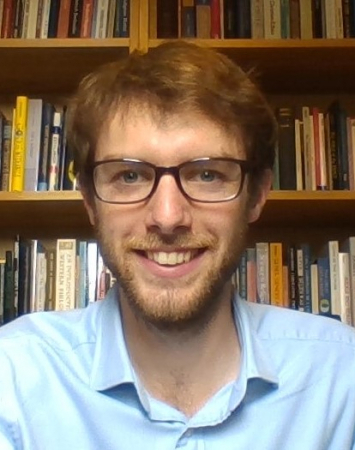
Dr Tim Middleton
Tim’s research concerns religious attitudes to the contemporary ecological crisis, with a specific focus on Christian ecotheology. He also maintains an interest in wider conversations in science and religion, and the environmental humanities.
Tim has backgrounds both in Theology and the Earth Sciences. His DPhil work in theology brings ecotheology into conversation with recent work in Christian trauma theology, exploring how the category of trauma might be applied to issues of nonhuman suffering in the context of mass extinction and catastrophic climate change. Tim has previously taught at St Anne’s College Oxford and the University of Roehampton, and is currently an Associate Tutor in Christian Doctrine at Ripon College Cuddesdon.
What are our religious visions of the deep, planetary future? How might theological understandings of salvation intersect, not just with human history, but also with the vast timespans of the Earth itself? And how do these expectations inform activists and policymakers today—both religious and secular—as they seek to address our current ecological crisis?
Tim’s research project aims to uncover the implications of different Christian eschatologies for our confrontation with ecological challenges in the present. Specifically, there is an urgent need for theologians to think about the long-term future of our planet, that is, to develop a theologically informed vision of what comes after the Anthropocene—not least because such visions of the future have implications for environmental ethics in the present.
The project will proceed according to three sets of interlinked research questions.
1. How do existing Christian eschatologies take account of our present Anthropocene context? To what extent are they cognisant of the Earth’s deep future? And how are these visions taken up by, or passively embedded in, the work of secular institutions?
2. What normative conclusions are implied by, or might be extrapolated from, specific eschatological perspectives? And how do these religious visions of the future impact the actions of both Christian faith communities and wider secular society?
3. Lastly, if Christians are to show moral leadership, by seeking to galvanise ecological conversion and practical change, what ought to be included in the visions of the future that they describe?
Tim is also collaborating with a public theology think tank called the William Temple Foundation to record a public-facing podcast series on long-term visions of the Earth’s future.
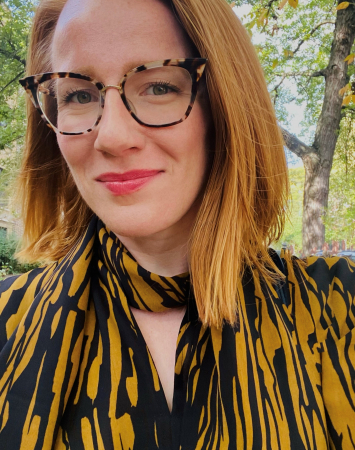
Raffaella Taylor-Seymour
Raffaella Taylor-Seymour is an anthropologist and scholar of religion. Her research examines religious transformations in the context of struggles over gender, sexuality, and the environment in Southern Africa. She is interested in the entanglement of multiple religious traditions in Zimbabwe, specifically ancestral spiritual practices, mission Christianity, and Pentecostalism. In a context in which colonialism forcefully upended ideas about personhood, spirituality, and ties between people and place, her work investigates how people navigate a diverse religious landscape and participate in lively debates about pressing contemporary social and theological questions.
Raffaella’s first project, which she is revising as a book manuscript, explores how young queer Zimbabweans bring Christian and ancestral religious practices into dialogue. This project argues that through religious practices, queer Zimbabweans draw on the archives of African and Christian metaphysics to express distinctively African queer subjectivities and articulate novel forms of kinship and intimacy. Her second project, which she is pursuing at Pembroke, explores everyday struggles over the meanings and effects of rainmaking rites among ordinary Zimbabweans against the backdrop of increasing water scarcity in Southern Africa.
Raffaella completed a joint PhD in Anthropology and Comparative Human at the University of Chicago in 2022, where she was a Fulbright Scholar and received the Charlotte W. Newcombe Doctoral Dissertation Fellowship. At Chicago, she was a Martin Marty Junior Fellow in the Divinity School, a Residential Fellow at the Center for the Study of Gender and Sexuality, and a Dissertation Fellow at the Center for International Social Science Research. Her doctoral thesis was awarded the Association for Feminist Anthropology's Dissertation Award. She an MA in Comparative Human Development from the University of Chicago and a BA in Archaeology and Anthropology from King’s College, Cambridge.
My fellowship project is entitled ‘Making Rain: Ancestors and the Absence of Water in Zimbabwe’, and builds on my work on religion and contemporary social change to investigate theological debates that arise in light of declining rainfall and water scarcity in Zimbabwe. Recently, theorists have argued that climate change entails not only ecological devastation but also gives rise to new social conflicts, political challenges, and epistemological uncertainties. Notably, some have suggested that climate change signals a shift away from ‘global’ perspectives, which emphasise the human capacity to exploit natural resources for economic gain, and the emergence of ‘planetary’ outlooks, which foreground the intertwined fates of humans and the natural world. As a result, struggles for justice and equality are no longer strictly about how best to organise systems of production and economic distribution, but also how to engender attachments between diverse forms of life. My research project contributes to these debates by examining how a changing climate throws people’s deepest metaphysical concerns into doubt in Southern Africa, creating not only to a crisis of survival but a crisis of knowledge and meaning.
Rain is so culturally significant in the Southern African region that scholars have argued it should be considered the foundational local epistemological category. Historically, rainmaking rites sought to ensure stable rainfall by appealing to the benevolence of ancestors. Although colonial rule marginalised ancestors in favour of Christianity, as crops have withered and city reservoirs reached dangerously low levels in recent years, some Zimbabweans have contended that ancestral rainmaking rituals must be revived. In response, many development practitioners and scientists have argued that rainmaking practices are outdated and that Zimbabweans need to be trained in tangible climate change adaptation measures. Yet as my second project posits, approaching debates about ancestral traditions as a hopeless strategy for responding to large scale environmental challenges neglects the reality that climate change doesn’t only threaten physical livelihoods, but also local epistemologies and attachments to place. Moreover, it fails to take seriously the knowledge and leadership that religious traditions might offer in response to ecological catastrophe. In this context, I ask: In what ways is climate change shaping religious practices and theological discourse in Zimbabwe? And how might these negotiations in Southern Africa inform broader understandings of the social, political, and theological challenges of climate change and sustainability?

Austin Stevenson
Austin Stevenson is a philosophical theologian who is interested in the way that philosophical ideas interact with religious beliefs to impact contemporary society. His current research concerns vaccine hesitancy among religious communities. His PhD (University of Cambridge) explored how certain philosophical ideas impact what it means to study Jesus as a historical figure. Austin has previously taught at the University of Cambridge, Ridley Hall, and the Faraday Institute for Science and Religion, and is currently a visiting lecturer at London School of Theology.
In 2019, the World Health Organization listed vaccine hesitancy as one of the top ten threats to global health. While many religious communities have been vital allies in the development and distribution of vaccines, others have played a prominent role in the spread of vaccine hesitancy. Importantly, this hesitancy is not the straightforward outworking of theological principles, but the result of a complex combination of historical, social, political, and religious factors. And yet, it is often understood, articulated, and disseminated in theological terms, which requires theological examination and response. Austin’s research addresses these issues in two ways.
First, it places Christian theology in conversation with available ethnographic studies of vaccine hesitancy and scientific literature regarding the development, safety, and efficacy of vaccines. This research will draw on the history of Christian support for vaccination and public health and the ways that different genealogies of modernity position Christianity with relation to modern science. It will also engage with recent research in metaphysics, virtue ethics, and theological anthropology.
Second, it seeks to provide theologically rich and scientifically informed resources to help pastors and other religious leaders to cast a positive theological vision for the role of vaccination in preserving the common good. This involves a significant amount of outreach and public engagement.
It is not the scientific questions that confound us—not whether vaccines are safe, effective, or necessary. What confounds us is humanity, and religious traditions possess vital resources for understanding human values and motivations, which determine our understanding of facts and inspire us to action.
This project is pursued in partnership with the Oxford Vaccine Group and the Vaccine Knowledge Project.
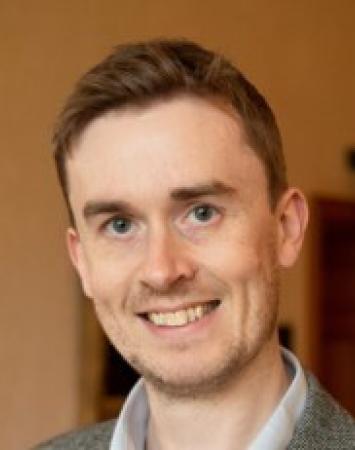
Dr Barnabas Aspray
Barnabas is a philosophical theologian interested in the way religious belief & practice interact with contemporary society. His PhD (University of Cambridge) explored human finitude and transcendence in the work of French philosopher Paul Ricœur. Barnabas also holds Masters degrees in Christian Theology and Biblical Studies from the University of Cambridge and Regent College. Before studying theology, he read computer science at the University of Exeter and worked as a software engineer for the BBC website.
What effect does Christianity have on behaviour towards refugees? How does Christian faith motivate political and practical action? What is an authentically theological approach to asylum & immigration, informed by the Bible and Christian tradition? Barnabas’ research addresses these questions in two mutually complementary ways:
1. It begins a dialogue between philosophical theology and forced migration studies. This means, first, applying theological insights to the contested field of refugee ethics; and secondly, showing what a ‘refugee hermeneutic’ can teach theology in return. Refugees are everywhere in the Bible and the Christian tradition, a rich resource to inform our understanding and guide our action.
2. It aims to discover and evaluate what Christians have done & are doing in response to refugees. All kinds of responses are taken into account – positive/negative, open/closed, opposed/welcoming – provided they have a Christian justification. This means also listening to refugees themselves, letting our preconceptions be transformed by dialogue and accompaniment, rather than treating them as an object of study.
Impact and outreach are crucial for this kind of project, to raise awareness and effect change. As well as academic outputs, it will produce a blog series and a short book, aimed at a popular audience, introducing the ethics of refugees from a Christian perspective.
This project is pursued in partnership with Refugee Education UK, a UK charity which helps refugee and asylum-seeking children and young people build more hopeful futures through education.

Dr Imen Neffati
Imen is a historian of modern France and the ‘Francophone world’ with broader interest in the histories of religion, secularism, and modernity.
Imen finished her PhD in 2019 at the History Department, University of Sheffield, on the history of the French satirical magazines Hara Kiri and Charlie Hebdo, and their discourses on religion, secularism, race and gender. Prior to that, she completed the Fulbright FLTA programme, the Erasmus Mundus Masters programme Crossways in Cultural Narratives, and holds an MA from Adam Mickiewicz University in Poznan in Gender Studies, an MA from the University of Sheffield in Cultural Studies, and an MA from Université de Perpignan in Approaches Hétérologiques du Monde Anglophone.
Imen’s project explores secularism and Muslim identity, and the tension between secularism and Islam. Islam’s positioning in relation to Western ideals of individuality, freedom, and women’s rights has been an abiding theme of sociological analysis and cultural criticism. Imen studies the specific challenge of gender inequality in Islamic inheritance law, particularly the case of Tunisia, which presents a unique case-study as a Muslim, Francophone, Arab country with strong yet complex ties with its colonial past. The project aims at investigating the State initiative to reform inheritance law in Tunisia by granting women equal rights to inheritance, by amending the existing code that limits women to half the share of men.
The project combines approaches from intellectual and cultural history, media studies, theology and jurisprudence to examine inheritance law and debates over its form in Tunisia to look at the evolution of Muslim identity in Tunisia since independence, particularly under the authoritarian secular regimes. It explores the impasse regarding socio-political reforms that are perceived contradictory to Islamic teachings, and thinks about the possibility of a secular Muslim identity. Through the question of gender equality in inheritance, this project will bring a new insight on the issue of secularization in Tunisia drawing on public debate and scholarly work by institutions such as the Zitouna Mosque, and the Zitouna University in the post-independence era.
The project is also based on primary sources and archival work undertaken in the Archives Nationales in Tunis, and it studies the work of the Individual Freedoms and Equality Committee in charge of legislative reforms. The work of NGOs active in Tunisia on questions of women’s and minorities’ rights such as the Tunisian Human Rights League, Association Tunisienne des femmes democrates, and Association Tunisienne de défense des libertés individuelles will be analysed. The project will also include an investigation of both official and unofficial political discourses by – as well as interviews with- members of the Islamic party Al Nahdha, and women members of the parliament from secular and religious political parties.
The project aims to investigate key concepts relating to progressivism, and the perceived dichotomies of secularism versus Islam, Muslim identity and citizenship, post-Arab Spring new Muslim identity and the idea that citizenship is secular. The project also evaluates the idea of the government as an agent of change, thinking about secular legal reforms in Muslim majority countries. It also investigates resistance amongst members of the Muslim community to reform inheritance law in Tunisia, and the Muslim World, thinking about how and why some of Tunisia’s imams have opposed reforms in terms of protecting the Islamic ‘image’ and identity of Tunisia.